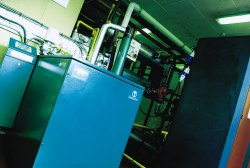CHP at BSRIA shows the way to retrofitting

This mini-CHP installation at BSRIA using a Baxi Technologies DACHs unit is expected to lead to the preparation of a industry guide on installing mini-CHP into existing buildings.
BSRIA has installed a mini-CHP (combined heat and power) system to serve its buildings in Bracknell. Fuelled by natural gas, the DACHs unit generates 5.5 kW of electricity and 12.5 kW of heat. The installation includes a condenser to recover additional heat from the exhaust of the CHP engine. It was supplied and commissioned by Baxi Technologies. This demonstration project is aimed at proving both the performance and reliability of the DACHs unit and is intended to lead to the preparation of an industry guide on retrofitting CHP into existing buildings. The DACHS unit was installed by BSRIA’s own staff, with support from Baxi Technologies.. This is the first DACHs installation in the UK to include an exhaust condenser. Because of the low return-water temperature from the heating system (45 to 50°C), the condenser is expected to increase heat output by about 2.5 kW, or about 20%. This increases the overall efficiency from 79% to about 90%, on gross calorific value. It is thought that this could be one of the most efficient CHP installations in the UK. The use of the condenser reduces the temperature of flue products to levels where plastic materials can be used for flueing — with the potential to reduce costs. The CHP unit has been set up to run 24 hours a day, every day of the year -— an intensity of use that will demonstrate its long-term reliability. It is expected to reduce carbon-dioxide emissions by 9 t a year compared with centralised power generation and heat-only boiler plant. Other companies contributing components to the installation were: Andrews Water Heaters, Switch 2, TA Hydronics, Armstrong Holden Brooke Pullen, Fernox, Trend, Coolers & Condensers Ltd and Flakt Woods.
Related links:


